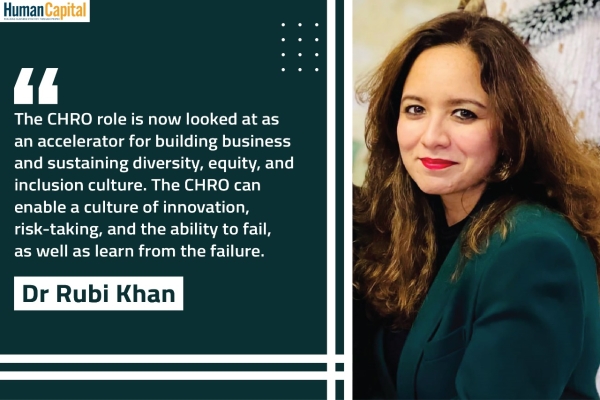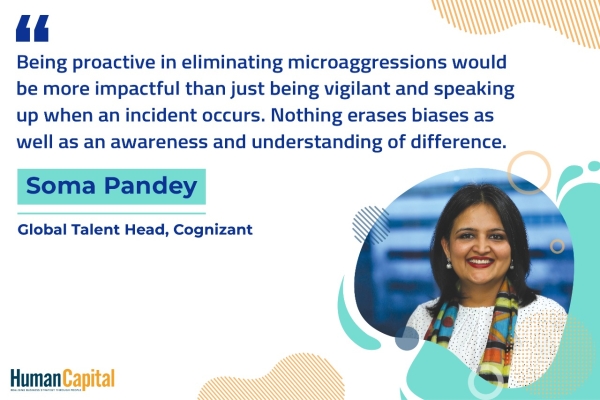Culture is beyond a shared set of norms, rituals, and practices that characterizes an Organisation. Culture has changed, and it is the CEO and CHRO’s deep and strategic relationship that can make this change for good.
Research by Mckinsey and the conference board consistently finds that CEOs worldwide see human capital as a top challenge, and they rank HR as only the 8th or 9th most crucial function in a company. However, the pandemic has given additional prominence to the CHRO in the Organisational dynamics. As rightly said, businesses don’t create value, people do. We all witnessed the great attrition, which made every Organisation pause and reflect on its purpose, culture, values, and employee experience.
An Organisation stands on a solid partnership of three critical roles in an ecosystem - CEO, CFO and CHRO. The shifts happening across the HR practices below are facilitating a strategic partnership between the CEO and CHRO are:
Strong Organisational culture on the bedrock of values:
The empirical investigation conducted in 2019 states that Organisational culture is back in vogue; however, not for all the right reasons. From the #metoo movement, staff fabricating bank accounts to meet their goals at U.S financial services, or the harassment and discrimination at the workplace, the culture of a toxic company is held responsible. We have instances of Enron and Toyota where the Organisation disproportionately compensated managers for cost restraint versus sustaining product quality. It encouraged everyone involved to ignore the facts and deny that a problem existed. The situation at the surface promised a reward through a performance management issue, but it was a deep-rooted problem.
A culture not aligned with company values was cultivated, leading to malpractices and adversely impacting the quality, business performance, and customer expectations. In this ever-changing environment, the CEO and CHRO should share visions for the Organisation and people. The Organisation’s values should be the core and the way of life. Unfortunately, culture is widely misunderstood and, at times, discussed in the most flamboyant manner. Culture is beyond a shared set of norms, rituals, and practices that characterizes an Organisation. Culture has changed, and it is the CEO and CHRO’s deep and strategic relationship that can make this change for good. Today employee’s touchpoint in an Organisation is its culture. Hence, culture has to be evolved. The pandemic taught an Organisation to be agile and people to be resilient. It required the enterprise to be flexible and keep its culture at the center, keeping its employees’ safety, welfare, engagement, development, and upskilling the highest priority.
Research shows that an employee feels their Organisation’s culture most powerfully through the company’s mission, values, employee recognition, celebrations, and approach towards employee performance. It is the CHRO to build open communication, approachability, and trust in leadership as well as facilitate conversations between leaders and employees.
Impacting business results and not limiting to people outcomes:
The unconventional CHRO does not look at employee engagement and retention as ultimate outcomes. There are no programs and initiatives run in silos. Every aspect of human capital within the enterprise is business backward. It is not what the HR function can offer, it is what the business wants, and the Organisation needs. It is what will create an impact on Organisational outcomes.
The CEO and CHRO should share an understanding of appropriate actions and desirable outputs. The CHRO should leverage the human capital and its knowledge to meet the business goals. They can be catalysts in predicting outcomes by asking important questions on critical roles, fitment of a leader on the role, high stakes jobs requiring close attention, a new product or technology requiring people with a niche set of skills. The CHRO, in collaboration with the CFO, should also consider whether the key performance indicators, talent assignments, and budgets are relevant to delivering desired outcomes. If required, they can also devise new people metrics or map the right metrics to bring effective business results.
The CHRO should have the right market intelligence with respect to competitor reward systems and increase in turnover, new expertise or niche roles getting created, and organic or inorganic growth. The CHRO should use sound judgment on the latency of data and recency of events while analyzing and interpreting the internal and external data. The role of CHRO is vital in recognizing talent, unleashing potential, building a talent pipeline, building succession planning, allocation and reallocation of human capital as per the strategic business needs, and skilling and upskilling as per the functional requirements. While this is just one part of it, the CHRO should also be an expert at required, they can also devise new people metrics or map the right metrics to bring effective business results. The CHRO should have the right market intelligence with respect to competitor reward systems and increase in turnover, new expertise or niche roles getting created, and organic or inorganic growth. The CHRO should use sound judgment on the latency of data and recency of events while analyzing and interpreting the internal and external data. The role of CHRO is vital in recognizing talent, unleashing potential, building a talent pipeline, building succession planning, allocation and reallocation of human capital as per the strategic business needs, and skilling and upskilling as per the functional requirements. While this is just one part of it, the CHRO should also be an expert at diagnosing how the various parts of the social system are working, systematically identifying the enablers and derailers. The CHRO’s role is not only searching for talent but also thinking ahead of time and anticipating the need for talent as the Organisation asks. The CHRO can avoid behaviors such as withholding information, failing to express disagreement, refusing to take action, and undermining peers.
Leveraging technology to build a stronger business partnerships
At Netflix, traditional HR processes and routines are organized under the finance function, while HR serves only as a talent scout and coach. Another way is to create a shared service function that combines the back-office activities of HR, IT, and finance. An EY study in 2017 found that 74% of the middle market CEOs worldwide shunned the idea of adopting robotics process automation in their enterprise. One year later, 73% of these leaders said they would begin using AI within two years.
Artificial Intelligence and other tools continue to automate the transactional task of human resources. As these tasks transfer to software, the HR team, including the CHRO, will be able to focus on complex, qualitative questions and add value by becoming true strategic partners. These artificial Intelligence tools build trust and help the CEO & CHRO in the process as they scale hiring and retention efforts. This also assures sustainability as a whole. Most importantly, it enhances the overall employee experience. Hence, companies invest in the right tools to find the right people, develop them, and build their careers to benefit the company.
CHRO combines grit and gumption with the heart at its core
Gone are the days when CHROs were only looked at as conscious keepers, gatekeepers, policymakers, and risk mitigators. The time has changed, and so has the need. CHRO has a unique ability to look at Organisations’ systems and processes through systemic thinking. CHROs have been known to be enablers, facilitators, and anchors in terms of partnering and serving leaders. But now it’s the time to move from being an order taker to asking tough questions. The role of a CHRO is to embrace the opportunity, take risks, and question the leadership team on their decisions with respect to sustainability, resources, talent, and culture. The CHRO should bring the people’s practices and business expectations in tandem, keeping the sense of nurturing, empowerment, empathy, and authenticity at the core, bringing a fine balance of head and heart.
It is good to have some noise in the room between the CEO and CHRO and let the CHRO become a mirror to the CEO, providing candid personal and behavioral feedback and Organisational input with the Organisation’s interest in mind. This makes this relationship a uniquely emotionally sensitive one. There can be anger, confrontations, heated arguments, and even counterattacks. This will set the stage for an authentic connection between them. Top talent may be a top talent, but not at the cost of digressing from the Organisation’s values and culture, becoming myopic only to performance, and letting everything else go.
Top talent cannot have a sense of entitlement, and if that is a tough conversation that a CHRO needs to have with the CEO, so be it. Likewise, the Organisation should give a top talent given a new role time to prove themselves. If a talent fails, it’s not only the talent at fault, and these aspects have to be brought to the notice of the leadership and the CEO. Let the CEO prepare for either a tough conversation or candid feedback. So that as an Organisation, leadership is also mindful in assessing talent and identifying the true potential.
A truly epic relationship
It’s always said that epic relationships require mutual trust and respect. In an epic relationship, the CEO trusts that the CHRO will use sound judgment when the matter is something that will put the company at risk without the CEO’s intervention. If the information is critical to the company’s interests, the CEO will be told; otherwise, it can remain confidential.
As Leena Nair rightly said, CEOs have to face two key decisions - “Where to put the money?” and “Where to put the people?”. And the CHRO has an important role in both of them. If you put money without people ready, it won’t work, and if you put the people but don’t give them the money and the resources, it won’t work either.
CHRO can be a strategic business partner and advisor if one is the business person with the same goal and understanding of the business as the CEO. It is extremely important to build the sound depth of line function and nuances of business to create an impact on people and Organisational outcomes.
The CHRO role is now looked at as an accelerator for building business and sustaining diversity, equity, and inclusion culture. The CHRO can enable a culture of innovation, risktaking, and the ability to fail, as well as learn from the failure. The CHRO is expected not to think, operate and work in a silo but come up with solutions that may be outside HR function. Building capability at domain, functional, and leadership levels as well as developing the workforce into a thinkforce and sustaining as well as scaling it has become an utmost priority in these changing times.
While CHRO is all set, the CEO should also look at CEO as a confidant for all the strategic insights, as a trusted advisor, and as a deliberate partner. Therefore, these two superpowers - CEO & CHRO- can build a powerhouse of revenue, culture, and people, resulting in sustainable and effective people and Organisational outcomes.
This can create a legacy for a lifetime for an Organisation and people to remember
Has COVID-19 forever changed the way we live and work?
Trending
-
SBI General Insurance Launches Digital Health Campaign
-
CredR Rolls Out 'Life Happens' Leave For Its Employees
-
Meesho Announces 30-Week Gender-Neutral Parental Leave Policy
-
Microsoft Unveils Tech Resilience Curriculum To Foster An Inclusive Future
-
60% Indian Professionals Looking For Job Change Due To COVID: Survey
-
SpringPeople And Siemens Collaborate For Digital Transformation Push
-
86% Professionals Believe Hybrid Work Is Essential For Work Life Balance: Report
-
Almost 1 In Every 3 People's Personal Life Affected Due To Work Stress
-
Meesho Rolls Out Reset And Recharge Policy For Employees
-
80% Of Talent Leaders & Academics Say Pandemic Changed Skill Needs For Youth: Report
-
Hero Electric Rolls Out 'Hero Care' Program For Employees
-
Human Capital In Collaboration With ASSOCHAM Hosts Virtual Conference
-
IKEA India, Tata STRIVE Collaborate To Create Employability And Entrepreneurship Opportunities
-
SAP India, Microsoft Launch Tech Skilling Program for Young Women
-
DXC Technology, NASSCOM Collaborate For Employability Skills Program
-
Lenskart To Hire Over 2000 Employees Across India By 2022
-
Mindtree Launches Learn-and-Earn Program
-
Tata AIA Extends 'Raksha Ka Teeka' To Its Employees
-
Swadesh Behera Is The New CPO Of Titan
-
NetConnect Global Plans To Recruit 5000 Tech Professionals In India
-
Hubhopper Plans To Hire 60% Of Indian Podcasters By 2022
-
Corporate India Needs More Women In Leadership Roles: Report
-
Aon to Invest $30 Million and Create 10,000 Apprenticeships by 2030
-
Tech Mahindra Launches ‘Gift a Career’ Initiative for Upskilling of Youth
-
40% Women Prefer Flexible Working Options in Post-COVID World: Survey
-
3 out of 4 companies believe they can effectively hire employees virtually: Report
-
Vodafone , CGI and NASSCOM Foundation launch digital skills platform
-
Odisha: Bank, postal employees to deliver cash for elderly, differently-abled persons
-
Skill India launches AI-based digital platform for "Skilled Workforce"
-
Hiring activity declines 6.73% in first quarter: Survey
-
70% startups impacted by COVID-19 pandemic
-
Bajaj Allianz Life ropes in Santanu Banerjee as CHRO
-
Over 70 Percent MSMEs look at cutting jobs to sustain businesses
-
93 Per Cent employees stressed about returning to office post-lockdown
-
Johnson & Johnson India announces family benefits for same gender partners
-
Indian firms turning friendly towards working mothers
-
Welspun India names Rajendra Mehta as new CHRO
-
Wipro partners with NASSCOM to launch Future Skills platform



Human Capital is niche media organisation for HR and Corporate. Our aim is to create an outstanding user experience for all our clients, readers, employers and employees through inspiring, industry-leading content pieces in the form of case studies, analysis, expert reports, authored articles and blogs. We cover topics such as talent acquisition, learning and development, diversity and inclusion, leadership, compensation, recruitment and many more.
Subscribe Now












































Comment